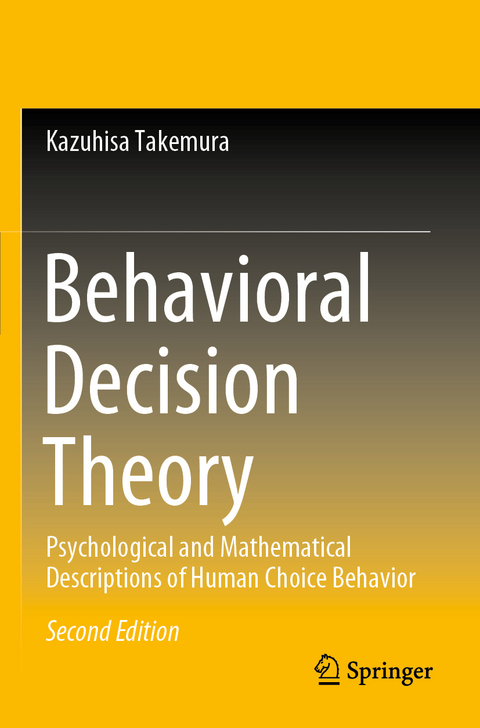
Behavioral Decision Theory
Springer Verlag, Singapore
978-981-16-5455-8 (ISBN)
The utility theory is often limited to qualitative knowledge;however, as the studies of Nobel laureates H. A. Simon, D. Kahneman, and R. Thaler have suggested, the psychological methodology and knowledge of behavioral decision theory have been applied widely in such fields as economics, business administration, and engineering and are expected to become even more useful in the future. Research into people’s decision making represents an important part in those fields, various aspects of which overlap with the scope of behavioral decision theory. This theory is closely related to behavioral economics and behavioral finance, which have come into greater use in recent years. This book will appeal especially to graduate students, advanced undergraduate students, and researchers who are interested in decision-making phenomena.
Kazuhisa Takemura is a Japanese psychologist and educator. Besides serving as a professor at the Department of Psychology, Waseda University, he is also the director of the University’s Center for Decision Research, a professor at the Waseda MBA School, and a research fellow at the Waseda Research Institute for Science and Engineering. He received his B.A. and M.A. degrees from the Department of Psychology, Doshisha University, in 1983 and 1985, and received his Ph.D. (System Science) from Tokyo Institute of Technology in 1994, and an additional Ph.D. (Medical Science) from Kitasato University in 2013. He has also worked abroad as a visiting researcher at James Cook University, La Trobe University, and Australian National University (Australia); the Tinbergen Institute (the Netherlands); Gothenburg University and Stockholm University (Sweden); the University of Konstanz (Germany); and National Cheng Kung University (Taiwan). He was also Fulbright Senior Researcher at the Department ofSocial and Decision Science, Carnegie Mellon University (USA) from 1999 to 2000, and a visiting professor at the Department of Psychology, St. Petersburg State University (Russia) in 2008, at Venice International University (Italy) in 2015. His main research area is human judgment and decision-making, especially the mathematical modeling of preferential judgment and choice. He received a Hayashi Award (Distinguished Scholar) from the Behavior metric Society (in 2002), an Excellent Paper Award from Japan Society of Kansei Engineering in 2003, Book Awards from the Japanese Society of Social Psychology (in 2010) and the Behaviormetric Society (in 2016), a Fellow Award from the International Association of Applied Psychology (in 2018), and Kimura Award, Transdisciplinary Federation of Science and Technology (in 2021). In the course of his career, he has taught extensively on behavioral decision theory at many universities (Waseda University, Tokyo University, Osaka University, University of Tsukuba, Kobe University, Nagoya University, Tokyo Institute of Technology, Gakushuin University, Rikkyo University, Tokyo International University, Kitasato University, Venice International University, St. Petersburg State University, and National Cheng Kung University).
-Preface.- I. Behavioral Decision Theory and the Idea of It.- Chapter 1. Decision-making Phenomenon and Behavioral Decision Theory.- Chapter 2. Preference and Preference Structure.- II. Preference Reversal Phenomenon and Description of the Phenomenon.- Chapter 3. Ordinal Utility and Preference Reversal Phenomenon.- Chapter 4. Causes of the Preference Reversal Phenomenon.- Chapter 5. Psychology of Preference Reversals and Prominence Hypothesis.- III. Expected Utility Theory and Its Counterexamples.- Chapter 6. Expected Utility Theory and Psychology.- Chapter 7. Axioms and Counterexamples Expected Utility Theory.- IV. Decision Making and Prospect Theory.- Chapter 8. Preference Paradox and Nonlinear Expected Utility Theory.- Chapter 9. Prospect Theory and Decision Making Phenomena.- Chapter 10. Prospect Theory and Decision Making Phenomena.- V. Framing Effect and Descriptions of It.- Chapter 11. Framing Effect of Decision Making.- Chapter 12. Theories Used to Explain the Framing Effect-Part VI Decision-Making Process and Its Theory.- Chapter 13 Decision-Making Process.- Chapter 14. Behavioral Decision Theories that Explain Decision-making processes.- Chapter 15. Time Discounting.- Chapter 16. Behavioral game theory and Social decision making.- Chapter 17. Preference formation, decision making, and neuroscience of decisionmaking.- Chapter 18. Behavioral decision theory and prescriptive approach.
| Erscheinungsdatum | 05.10.2022 |
|---|---|
| Zusatzinfo | 33 Illustrations, color; 60 Illustrations, black and white; XVII, 394 p. 93 illus., 33 illus. in color. |
| Verlagsort | Singapore |
| Sprache | englisch |
| Maße | 155 x 235 mm |
| Themenwelt | Sozialwissenschaften ► Soziologie |
| Wirtschaft ► Allgemeines / Lexika | |
| Wirtschaft ► Betriebswirtschaft / Management ► Unternehmensführung / Management | |
| Wirtschaft ► Volkswirtschaftslehre ► Mikroökonomie | |
| Schlagworte | Behavioral decision theory • Behavioral Economics • Decision Theory • Economic Behavior • Measurement Theory |
| ISBN-10 | 981-16-5455-7 / 9811654557 |
| ISBN-13 | 978-981-16-5455-8 / 9789811654558 |
| Zustand | Neuware |
| Informationen gemäß Produktsicherheitsverordnung (GPSR) | |
| Haben Sie eine Frage zum Produkt? |
aus dem Bereich


